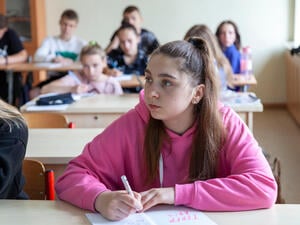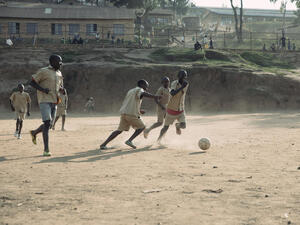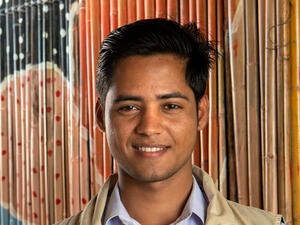Iranian charity provides medical care to refugee children
Iranian charity provides medical care to refugee children

The painting room at the MAHAK facilities provide children undergoing cancer treatment and their families with a psychological boost during their stay.
TEHRAN, 14 August (UNHCR) - Ali was a two-year-old Afghan refugee when a seemingly benign lump on his nose started growing at an alarming rate. But thanks to a partnership between the UN refugee agency and the Iranian medical charity MAHAK, his frightened father now expects to see him grow up.
"At one point it was so big that it would block his eye sight," his father said. Ali, sitting in his father's lap, was drowsy after another chemotherapy treatment. "He has been enduring chemo for more than four months and is now ready for radiotherapy. The doctors are very optimistic."
Six months before, the lump had suddenly started growing and a CT scan confirmed he had a highly malignant cancerous tumor. UNHCR had earlier helped his father, a typist with two other children, to obtain health Insurance cards for his family but the ceiling would not cover the high costs of Ali's treatment.
Fortunately, UNHCR and MAHAK have worked for more than 10 years in a fruitful collaboration to provide assistance to cancer-stricken refugee children. Ali's father, among the many Afghans still refugees more than three decades after their homeland descended into war, was thrilled when UNHCR told him MAHAK could help his son.
MAHAK is a non-profit, non-political, and non-governmental charity focused on treating children with cancer. It uses the most up-to-date diagnostic, treatment and prevention methods, with both outpatient and in-patient services. It provides chemotherapy, medication, lab tests, radiation therapy, CT scan, transportation and family counseling - all without regard to religion, race or nationality of patients.
MAHAK is supported by fundraising and humanitarian assistance in the form of money, goods, services and technical expertise. Under the joint UNHCR-MAHAK project for 2013, a total of 76 Afghan and Iraqi refugee children under the age of 15 who suffer from cancer will be provided with medical treatment.
Under this project, the accompanying parent is also provided with counseling, accommodation and food when needed because they reside outside Tehran and face difficult economic conditions.
Iran has generously hosted the second largest refugee population in the world for over three decades -- currently more than 880,000 refugees, some 40,000 from Iraq and the rest from Afghanistan. The government of Iran has always provided its refugees with access to the main areas of education, livelihood and health, some of which can be life-saving.
On a recent visit by UNHCR staff to MAHAK facilities, in the colorful and bright painting room mothers were creating artwork to be auctioned off to raise funds for the charity. The mothers, who get training, help with the children and paint with them, creating a warm atmosphere where they can escape the reality of what they face everyday.
MAHAK takes every opportunity to cheer up the children. Javad Nekoonam, a famous Iranian football player, recently joined them for a short game. The staff of MAHAK convey their own hope, enthusiasm and energy to the children. Some are volunteers, families of patients who have themselves survived cancer, and strong believers in what can be achieved.
Many refugee families had stories like that of Ali, all grateful for the economic and psychological help the UNHCR-MAHAK agreement has brought to their lives. There were children from 2- to 17-years-old struggling with leukemia, Hodgkin's disease, cancerous tumors and undergoing chemotherapy and radiotherapy.
For some the difficult road of treatment has just begun and for some it has fruitfully come to an end. The lump on Ali's nose is still noticeable but his father says it has shrunk considerably with the chemotherapy.
"Without them I would have had to watch my son's condition deteriorate and die before my eyes as I would have in no way been able to afford private or even public health centers," Ali's father said. "No words suffice; no words can explain how thankful we are to every single person who has contributed to our son regaining his health. I now get to watch him grow up."
By Sharareh Jalali in Tehran








